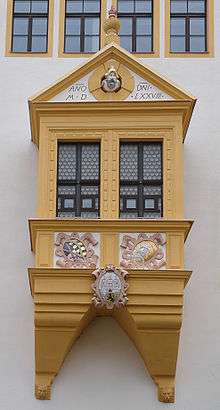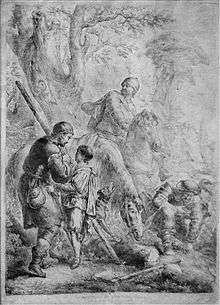Kunz von Kaufungen
Kunz von Kaufungen (also known as Conrad von Kaufungen, or Kunz von Kauffungen; c. 1410 - 14 July 1455) was a German knight and military commander. A veteran of the Hussite wars, he also fought for Frederick II, Elector of Saxony against Frederick's brother Duke William III during the Saxon Fratricidal War (1446–1451). Afterwards, Kunz was not repaid or recognized for his services and loss of property during the war, and eventually during the Prinzenraub (English: "The stealing of the princes") he kidnapped Frederick II's two sons. He was caught and later executed.

Background
Kunz von Kaufungen was a knight who lived in the tower of Kaufungen located near modern-day Limbach-Oberfrohna.[1][2] Kunz was known for defeating and holding for ransom Albert III, Elector of Brandenburg, one of the best fighters of the time.[3] Kunz also fought in the Hussite wars.[3]
Relationship with Frederick II, Elector of Saxony
Saxon Fratricidal War
The Saxon Fratricidal War first broke out between Frederick II, Elector of Saxony and Duke William III in 1446 when they were unable to resolve their dispute in the Division of Altenburg.[4] Frederick proved stronger, and William brought in forces from Bohemia, including Hussites. Frederick's forces were led by various commanders and captains, including Kunz von Kaufungen.[1] Kunz won a victory at Gera while commanding Frederick's forces and occupied the small town, however William's forces and Bohemian allies caused a large amount of damage to the area around Kaufungen in return.[3] Kunz had much of his property destroyed and was captured by Bohemian forces. Eventually he paid the sum of 4,000 golden gulden for his freedom, which was a very large sum for the time.[3] No side could gain a clear advantage throughout the war and the fighting turned out to be an extended period of "ruinous confusion" for the region.[1] The war lasted five years and ended on 27 January 1451, when a peace was reached at Naumburg.[5]

The Prinzenraub
After the war, Kunz von Kaufungen expected to be repaid by Frederick II for the massive losses of his property during the fighting. Frederick also had losses of his own, and, therefore, followed his contract with Kunz and did not repay the damages or the ransom Kunz paid to the Bohemians. Frederick stated that Kunz was just his hired soldier, and he was not bound to protect him or repay his losses.[3] Frederick eventually agreed upon bringing in arbitrators to settle the case, but Kunz left the arbitration before hearing the verdict when he realized it would not reach his expectations.[6] Kunz continued to complain and insult Frederick until Frederick banished him from his land. Kunz left to Bohemia and lived in the castle of Isenburg[7] until, on 7 July 1455, Kunz kidnapped Frederick's two sons, Ernest and Albert, from the castle of Altenburg in what was called the Prinzenraub (English: "The stealing of the princes").[8][9] Kunz planned and did this as revenge for the lack of recognition and payment for his previous services to Frederick II.[2] Prince Albert was found on the same night of the kidnapping when Kunz was overwhelmed and captured by a collier.[2] Prince Ernst was released four days later when Kunz's accomplices released him for a pardon.[10] On 14 July 1455 Kunz von Kaufungen was beheaded by order of Frederick at the marketplace of Freiberg.[2][9]
References
- Carlyle, p. 309.
- Quinger, p. 18.
- Carlyle, p. 310.
- Czok, p. 163.
- Historische Commission bei der Königl. Akademie der Wissenschaften, p. 779.
- Carlyle, pp. 310–311.
- Carlyle, p. 311.
- Carlyle, p. 312.
- Carlyle, p. 316.
- Carlyle, pp.312–313.
Further reading
- Carlyle, Thomas (2002). Historical Essays. Berkeley: University of California Press. ISBN 978-0-520-22061-4.
- Czok, Karl (1989). Geschichte Sachsens (in German). Vienna: H. Böhlaus. ISBN 978-3-7400-0062-2.
- Historische Commission bei der Königl. Akademie der Wissenschaften (1878). "Ficquelmont — Friedrich Wilhelm III. von Sachsen-Altenburg". Allgemeine Deutsche Biographie (in German). Leipzig. 7: 778–779. Retrieved 2008-12-05.
- Quinger, Heinz (1999). Dresden und Umgebung: Geschichte, Kunst und Kultur der sächsischen Hauptstadt (in German). Ostfildern: DuMont Reiseverlag. ISBN 978-3-7701-4028-2.